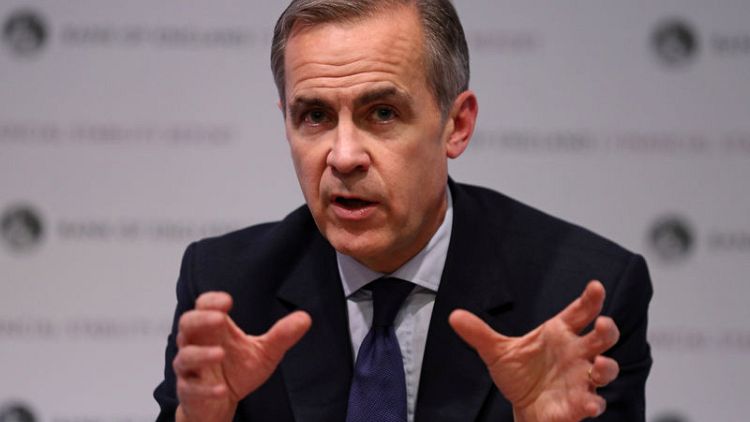By David Milliken and Huw Jones
LONDON (Reuters) - The Bank of England warned on Wednesday that Britain's large current account deficit remained a big risk ahead of Brexit, and that a jump in sterling after parliament crushed Prime Minister Theresa May's Brexit plan should not give too much comfort.
A senior BoE official said foreign investors in speculative assets had plugged much of the balance of payments shortfall last year, a reliance which left Britain vulnerable at a time of deep uncertainty about how it will leave the European Union.
Financing Britain's current account deficit, the biggest of any major economy, hinges on providing a predictable business environment, BoE Governor Mark Carney said.
Carney and his colleague Alex Brazier were addressing British lawmakers a day after May suffered a historic defeat in parliament on her Brexit plan, 10 weeks before Britain is due to leave the EU.
"We are reliant, as I think the governor said a few years ago, on the kindness of strangers," Brazier, the BoE's executive director for financial stability, told parliament.
He said 60 percent of inflows of foreign capital came from investment in British commercial real estate and leveraged loans issued by companies with already-high levels of debt, in a shift away from previous investment in plant and machinery.
"It's not difficult to imagine a number of things both external and internal that could change that risk appetite," Brazier said.
If British trade flows were affected by new trade barriers - something that could happen it the country crashes out of the EU without a deal - the country would not be able to sustain its existing current account deficit, he said, and this would lead to "a painful adjustment" of less investment and a weaker pound.
"Ultimately the UK has the mechanism, a flexible exchange rate, to make that adjustment, but getting from A to B is not straightforward," he said.
The BoE has said Britain could suffer greater damage to its economy than during the 2007-09 global financial crisis under a worst-case, no-deal exit from the EU.
In a report in November, the Bank said the "disorderly" exit scenario - involving severe delays at UK borders and financial markets losing confidence in British institutions - could lead to sterling falling to almost the same value as the dollar, 6.5 percent inflation and a 30 percent fall in house prices.
Carney said sterling's rise after May's Brexit blueprint was rejected in parliament by a record margin on Tuesday evening suggested investors now see less risk of a no-deal Brexit, or that the process would be extended.
"I'm not giving my view, I'm giving the markets' initial take," Carney told the MPs at a regular hearing in parliament. "I wouldn't put much weight on these very short term moves. The market is waiting."
The British pound rallied to its highest in nearly two months against the euro on Wednesday. Against the dollar <GBP=D3>, the pound was broadly flat at $1.2850 after jumping by nearly a cent following Tuesday's vote.
(Additional reporting by James Davey and Elisabeth O'Leary; Writing by William Schomberg; Editing by Mark Heinrich)



